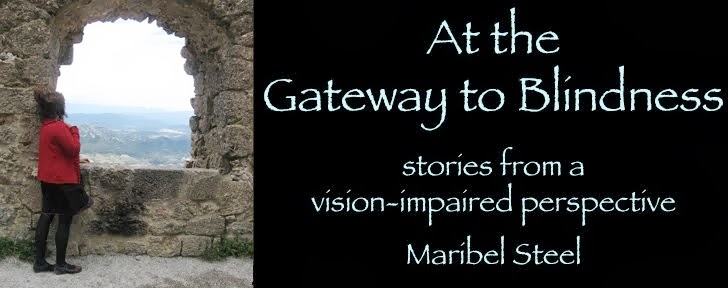This story is for Bee, who I know will understand and appreciate the
sentiments…
Being vision-impaired is a ‘funny’ thing sometimes. Because I cannot
rely on my poor ailing eyes to see, other senses have jumped to my rescue (and those
of my family) as invaluable tools of the blind-trade. Eyes do what they can –
but my hearing, sense of touch, taste and smell, memory and intuition, complete
the survival tool kit.
I have noticed how sighted people are a little lazy when it comes to
remembering details like phone numbers or web addresses or even where they last
put something down – because of course, they can simply look for it again. But
I cannot afford such a luxury - the frustration
is too great. My dear friend, Ms Memory, is always ready to record details and
file them in folders and subfolders that reside somewhere in my brain – a
filing cabinet full of trivial and important notes written in a hurry but filed
impeccably by Ms Memory. Without her skill to retrieve data at a moment’s
notice, I don’t think I would function so confidently in a sighted-world.
I am forever touching things to remember them, wherever I go, to
make sense of the blurry things in front of me - sometimes annoyingly so. In a
queue, at a market stall, in an office supply,
at a fruit stand, among fragile homeware products and while standing
idly at shop counters. Often it is my children that say “Mum! Stop touching
everything!” I feel like a naughty child trying to understand a myriad of
things all around me, and I find it amazing how gracefully my fingers can
locate items without knocking them onto hard tiled floors.
At home, the ‘hand police’ patrol the domestic precinct and often
come across misplaced objects – mostly my partner’s – so Ms Memory jots it
down. Yep, his wallet in the washing basket…guitar capo in the bookcase,
because, guess what? Without fail, I know he will ask,
“Have you seen my…?”
This common phrase in our home amuses me. Yes, the blind lady will
find your misplaced item, dearest - shoes – glasses – keys – camera lens –
laptop (a game usually played in haste on the way out of the door to a gig or before
a weekend getaway).
The other thing that keeps me happily chugging along without full
sight is being organised – very organised! There is a place for EVERYTHING. This
saves precious time, energy and helps to steer clear of deep frustration and
feelings of inadequacy. People may not appreciate how important it is not to
move or change the way a blind person arranges their work space or home. I have
crumpled to the floor in a pool of tears on several occasions, defeated by despair
at having to give up the search for a simple kitchen utensil put away by a ‘helpful’
person. My dear friends reading this will now wonder if it is a reference to
them? Relax – this was a few years ago – I have trained most people in my inner
circle to understand the reason for my bossiness to leave things alone
(especially the settings on my laptop). Now if they asked me if they could tidy
up grubby stains on the cream walls? Not a problem - go for it!
Being methodical, tidy and organised brings reliability. I prefer to
allow time when preparing to go out into
the big wide world of unexpected obstacles. Calm order allows me to fully
concentrate as I march with cane in hand, sweeping a clear path in front, body
language clearly stating to oncoming human-traffic, ‘keep out of my way, I’m on
a mission’. If, however, I am asked to fly by the seat of my unprepared,
unironed pants, as sometimes naturally happens, particularly when caught up
with Hurricane-Harry – life becomes…interesting…
“Have you seen my laptop? I’ve got to be at the gig in fifteen
minutes,” he says.
Without time to look properly, he leaves the house and within ten
minutes my mobile phone rings. What has
he forgotten now?
“I’ve left my suit behind!”
Why am I not surprised? He gabbles about where he put it, in the
hall, intending to take it but so many things to remember… Calmly, I reassure
him I will catch a tram, in the rain, and bring it to him, ok?
So, wielding trusty white cane, holding beloved umbrella purchased
in the south of France, and carrying heavy suit wrapped in special covering:
on
a tram…into the city…in the rain...went Santa Maria del Traje!
(Spanish for Saint Mary of the Suit!)
© Maribel
Steel 2012
***
